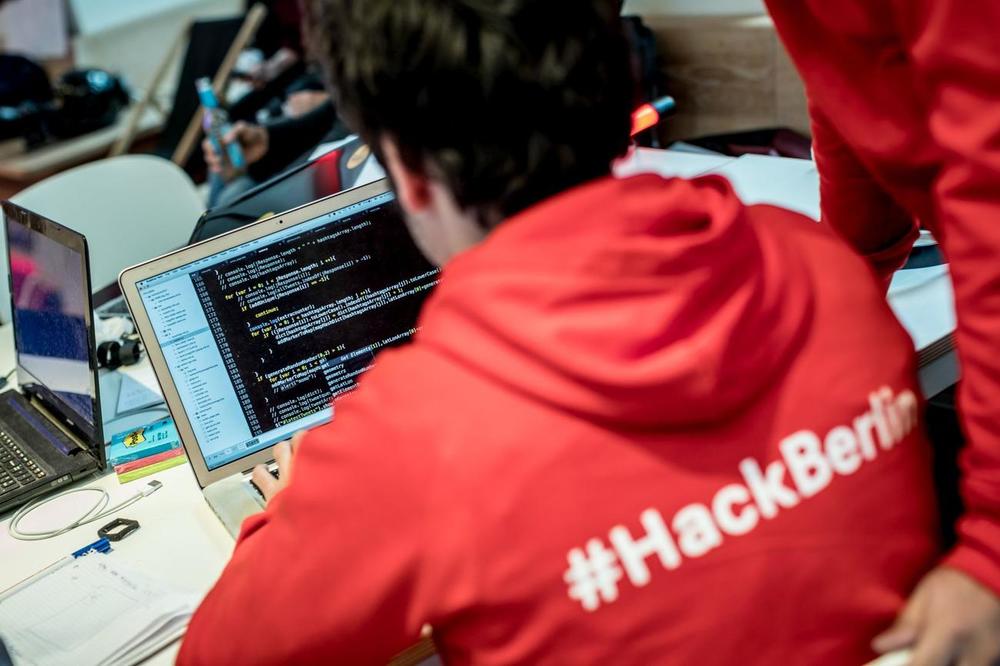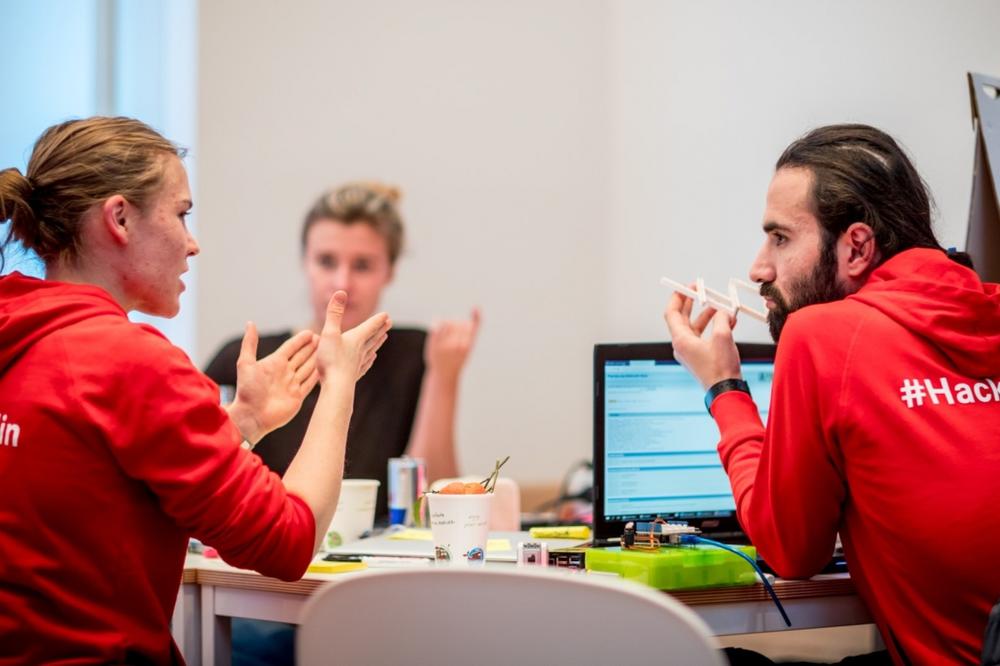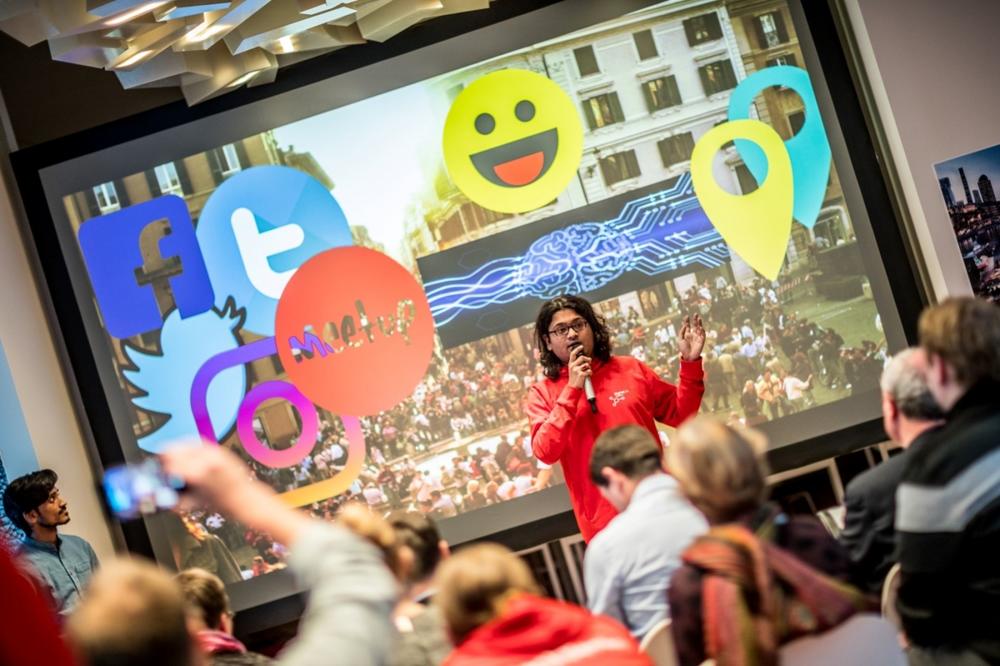A Hackathon to Determine the Transportation of the Future
At the Einstein Center Digital Future, students were invited by an automotive group to develop digital solutions on the theme of Urban Mobility.
Jan 23, 2018
In the hackathon, Berlin students enrolled in computer science and business and economics had 24 hours to develop a business idea and prototype for urban mobility of the future.
Image Credit: DigitalLife@Daimler
The world is at the threshold of a revolution in mobility. Electric propulsion, autonomous control systems, the sharing economy, and Big Data – the way we get around will change radically in the next decades. “It is quite obvious that the automotive industry has a vested interest in the digital revolution,” says Christian Meske, since the current winter semester a junior professor at Freie Universität in information systems, with emphasis on digital transformation and strategic information management. “Everyone wants to be at the forefront and to marry the latest technologies with the best business models.”
Daimler came knocking at the door of the Berlin universities to enlist students’ help and garner their know-how. The automotive group organized a competition together with Christian Meske, whose junior professorship was set up in cooperation with the Einstein Center Digital Future (ECDF), and his colleague Martin Gersch, a professor at the department of information systems at Freie Universität. The competition was open to junior programmers and students of business and economics. ECDF is a research institution on the digital future which was initiated by Freie Universität Berlin. Humboldt Universität zu Berlin, Technische Universität Berlin, Charité - Universitätsmedizin Berlin, the Berlin University of the Arts, and eight nonuniversity research institutions were also invited to the event, which was called Hack.Berlin on Urban Mobility.
Students and their ideas are an important factor at the Einstein Center Digital Future, not only as researchers but also as people who help shape tomorrow’s world.
Image Credit: DigitalLife@Daimler
Students of Freie Universität, Humboldt Universität, and Technische Universität met as members of various teams for the “Hackathon.” Their mission: to develop a prototype in connection with a business idea – within 24 hours. “Students foresaw the transportation of the future,” says Meske. “Their task was to develop new solutions for mobility in the digital age.” The competitors had to convince a jury in a three-minute sales pitch. “After 24 hours of hard work, this was a bit of a challenge,” says Meske.
A number of coaches and mentors were on hand to support the 30-odd students during the course of the development marathon. Meske himself as well as university colleagues and Daimler employees were there to help participants, and refreshments were available in the form of snacks, hamburgers, and of course, energy drinks. After 24 demanding hours, the students produced five solutions on the theme of Urban Mobility, from which the top three were chosen for an award.
“The jury members came from the fields of academia, politics, and business,” Meske explained. “Each chose their own favorites.” The prize for science went to the “Package Hunter” team, who had developed a community-based app which comes to the rescue when a parcel carrier is at your door, but no-one is in. “The Package Hunter alerts people in the locality, such as neighbors who also have to go to the local post office to collect packages,” Meske says. “For a small fee, they can tender a small price to collect a package at the collection point, or indeed take packages there.”
The political jury awarded their prize to “smove.” The team had built a prototype for a program that uses the sensors in smart phones and cars to produce a map reflecting the quality of roads and traffic infrastructure in Berlin. “Smart phones record practically every step we take,” says Meske. “Why not use the available hardware to find out about the quality of our mobility?” People with baby carriages, bicycles, or wheelchairs could find out their best route and the administrative services could at the same time find out where a need exists for road repair, for instance.
Team CityBuzzer won first prize for a prototype that measures mobility needs using social media activities. They won the chance to present their idea to the February Mobile World Congress in Barcelona.
Image Credit: DigitalLife@Daimler
Team “CityBuzzer” were the happy recipients of the first prize by Daimler. Their working prototype was developed to measure mobility needs using social media activities. This involves, for example, an evaluation of the frequency of hashtags with delimited geolocation on Twitter. Take a concert in the city which is just coming to an end – a large number of people twittering in that locality. Taxi drivers and other service providers could be sent a message about potential transportation needs so as to position themselves accordingly.
As winner, Team CityBuzzer was granted the opportunity to travel to the Mobile World Congress in Barcelona and present their idea to an international audience. The Hackathon winners will also receive support from Daimler for fine-tuning their business concept. Individual members of the “smove” and “Package Hunter” teams each received 200 euros prize money.
“Hack.Berlin” is in tune with the spirit of the Einstein Center as a place where we aim not only to research but also to help shape the digital future,” says Meske. “Students, with their ideas for innovation, are an important factor.” For Meske, the Einstein Center thus represents a place where professors and students alike can form networks across institutions and also enter into an exchange with business leaders. “Companies like Daimler are hugely supportive when it comes to encouraging our top students,” he says. “Some may go there as working students or trainees – which may lead before long to employment.”



